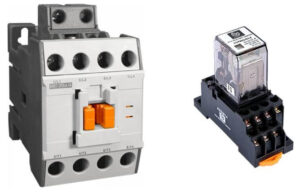
Menu
OrientMCT
Contactors and Relays
The Contactors and Relays course provides comprehensive knowledge and practical skills related to the operation, selection, installation, and troubleshooting of contactors and relays in electrical systems. Contactors and relays are essential components in control circuits, allowing for the control and switching of electrical loads.
Here are the key topics covered in the course:
Introduction to contactors and relays: Understanding the basic principles and functions of contactors and relays in electrical systems. Exploring the differences between contactors and relays, their applications, and their role in control circuits.
Contactors: Learning about the construction, operation, and types of contactors. Studying the various contact arrangements, including NO (normally open) and NC (normally closed) contacts, and their significance in controlling electrical circuits. Examining the different ratings and specifications of contactors, such as voltage rating, current rating, and thermal ratings.
Relay principles: Exploring the principles of relays, including electromagnetic relays, solid-state relays, and reed relays. Understanding how relays work, their input and output configurations, and their use in signal conditioning and control applications.
Control circuit design: Gaining knowledge of control circuit design using contactors and relays. Understanding the concept of ladder diagrams and logic control, and how contactors and relays are used to create control sequences for motors, lights, and other electrical loads.
Selection and installation: Learning the factors to consider when selecting contactors and relays for specific applications. Understanding the importance of proper sizing, voltage compatibility, and load requirements. Studying the installation procedures, including wiring techniques, connection considerations, and safety precautions.
Troubleshooting and maintenance: Developing skills in troubleshooting contactors and relays. Learning common issues and malfunctions, such as contact welding, contact erosion, and coil failures. Understanding diagnostic techniques, testing procedures, and replacement methods to ensure the reliable operation of contactors and relays.
Safety considerations: Emphasizing safety practices when working with contactors and relays. Understanding electrical hazards, lockout/tagout procedures, and personal protective equipment (PPE) requirements. Promoting adherence to electrical codes and regulations to ensure safe installation and maintenance practices.
By completing the Contactors and Relays course, participants will acquire the necessary knowledge and skills to effectively work with these vital components in electrical systems. They will be able to select, install, troubleshoot, and maintain contactors and relays with confidence, ensuring proper control and switching of electrical loads in various applications.

Get In Touch!
Contact us for a quote or in case of any urgent queries please send us an email on: info@orientmct.com
we will get back to you right away!